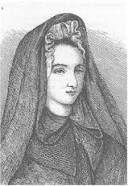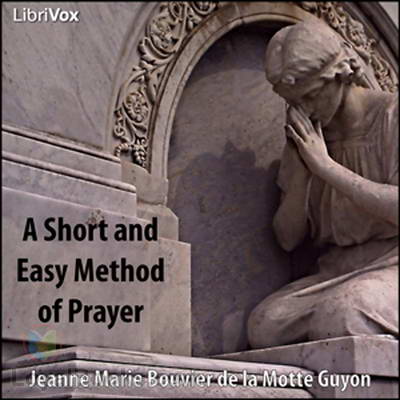Dear child of God, your Father has His arms of love open wide to you. Throw yourself into His arms. You who have strayed and wandered away as sheep, return to your Shepherd. You who are sinners, come to your Savior. Jeanne Guyon
 Jeanne Marie Bouvieres de la Mothe Guyon (known as Madame Guyon) was born April 13, 1648. She was a French mystic and is also known for her involvement in the “Quietist” movement. Her chief contribution to the Kingdom of God is her writing on prayer. Madame Guyon believed that Christians should pray all the time no matter where they are or what they are doing. The most beautiful, satisfying part of the Christian life is to spend time with God. Jeanne Guyon proved with her own life just how important intimacy with Christ is for the believer.
Jeanne Marie Bouvieres de la Mothe Guyon (known as Madame Guyon) was born April 13, 1648. She was a French mystic and is also known for her involvement in the “Quietist” movement. Her chief contribution to the Kingdom of God is her writing on prayer. Madame Guyon believed that Christians should pray all the time no matter where they are or what they are doing. The most beautiful, satisfying part of the Christian life is to spend time with God. Jeanne Guyon proved with her own life just how important intimacy with Christ is for the believer.
Jeanne Guyon came into this world during the very corrupt seventeenth century in France. At this time the French nation was well-known for its degeneracy. The church was as bad as the world. Even at the time, many people believed that Jeanne Guyon was one of the most spiritual women who ever lived, yet the corrupt Roman Catholic Church burned her books, condemned her principles of Quietism, and cruelly imprisoned her. Jeanne even spent several years in the Bastille.
Because Jeanne’s family was in French high society, she had the privilege of getting an education in a prosperous convent. Early in her life it became obvious what a gifted child Jeanne was. She began to read the Bible at age ten and decided to devote her life to God.
Jeanne wanted to enter a cloister, but her parents married her off to Jacques Guyon, a man of weak health. Jeanne was not quite sixteen years old; Jacques was twenty-two years her senior. Though Jeanne developed a love for her spouse, and claimed that he loved her, her mother-in-law was a severe trial to her for most of her life. The maid that was provided for Jeanne also put on airs and gave Jeanne a lot of grief.
No matter what happened, Jeanne turned to God in prayer. “It was in a condition so deplorable, O my God, that I began to perceive the need I had of Thy assistance… Thou didst draw me to Thyself.” Jeanne knew that her only hope was in the Savior.
Jacques died when Jeanne was twenty-eight years old, leaving her with three young children. He left Jeanne very well off and Jeanne spent the next 40 years of her life serving God by giving away money to the poor. She also began her career as an evangelist and a writer.
Jeanne spent a few years in Geneva and returned to Paris in 1686. When she arrived home, she was imprisoned for her opinions. With the help of Madame de Maintenon, she was released. Now Jeanne began to teach and write about Quietism.
Quietism is a form of mysticism that teaches devotional contemplation and the surrender of the will to God’s will. Quietists calmly accept things as they are without complaining. Madame Guyon exemplified this in her life. She refused to retaliate against her husband or mother-in-law no matter how badly they treated her. Many Christians learned from her example and imitated her ways.
Madame Guyon began traveling throughout France and Switzerland teaching people to pray more and live holy lives. She met with individuals and tried to avoid “preaching”. Many people found comfort in her words.
Why would the Roman Catholic Church oppose this? The church taught that it was the business of the priests to pray. Believers could not approach God on their own. They must go through the priest. Jeanne was especially offensive to the church because she was a woman.
Jeanne continued to teach people to pray from their hearts. She taught that they could achieve intimacy with God apart from the need for a priest. In 1685, Jeanne wrote a book called “A Short and Very Easy Method of Prayer”.
they could achieve intimacy with God apart from the need for a priest. In 1685, Jeanne wrote a book called “A Short and Very Easy Method of Prayer”.
The book became so popular that groups of Roman Catholic priests went about confiscating them to destroy them. They came into the town of Dijon, France, and gathered up a total of 300 copies and burned them! One Frenchman was known to have taken over 1500 copies and passed them out. The church saw Jeanne’s book as going too far against their authority so they arrested her.
Madame Guyon spent seven years in prison, the last two in solitary confinement in the Bastille. She continued to write while in prison. Jeanne produced a 20-volume commentary on the Bible, an autobiography, and many short works. There are precious collections of letters, especially those shared with Archbishop Francois de Fenelon, the most celebrated churchman of the day. Jeanne and Archbishop Fenelon were friends for twenty- five years.
Eventually, Jeanne was released from prison. She lived for another fifteen years in retirement with her daughter. She entertained many visitors from all over the world.
Madame Guyon died quietly in Blois, June 9, 1717, age sixty-nine.
Many have admired Jeanne Guyon very much. Shortly after Jeanne’s death the Quakers began using her book on prayer. It is said to have affected the Quaker movement more than any other single piece of literature. Others who were influenced by Jeanne Guyon were Count Zinzendorf and the Moravians.
John Wesley said of her, “How few such instances do we find of exalted love to God, and our neighbor; of genuine humility; of invincible meekness and unbounded resignation.”
One of the greatest persons influenced by Madame Guyon was Watchman Nee. Along with Madame Guyon’s autobiography the book on prayer also became an indirect influence on many of Watchman Nee’s co-workers.
I hope you will get some of Jeanne Guyon’s books. They are beautifully written and inspiring. Here are some excerpts from Chapter 1 of “Intimacy with Christ”. This “chapter” is a letter written in response to some correspondence she received. In this example you will see her earnest desire for prayer and for Quietism.
It makes me happy to see Jesus Christ inwardly reigning in the heart of one of God’s children. Thank you for your good letter….
Many pray, “Thy will be done on earth as it is in heaven,” but have no intention of giving up their own ways, nor of allowing the cross to deal with their most deeply held desires. God wants to take each one of us, although we naturally resist it, through a desert time of experiencing the cross. He does not want to make it hard on us for no reason, but only so that we might enter the quiet rest of the promised land with Him….
The Lord gave you no strict rituals to follow. He teaches you to “enter into your closet,” that is, to quiet yourself, open your heart, and without many words, to touch your Lord who is within you.
The Sabbath is not just a day of outward rest, but the continual rest that you are privileged to enjoy when you are in union with God. How I wish that all Christians would know this deep, restful union with God; to live in God and have God live in them!

